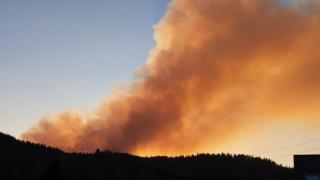Hot summer saw Wales' grassfires soar 75% in one year
 Image copyright
Gary Smith
Image copyright
Gary Smith
Arsonists were responsible for a 75% spike in grassfires in the past year, new figures have shown.
A total of 2,850 fires were started from April 2018 to March 2019, compared with 1,627 in the 12 months previously.
Fire chiefs said these figures were "very disappointing", and attributed it to last year's hot and dry summer.
Wales' fire services have developed an educational programme in a bid to tackle the problem, resulting in 60,000 speeches to schoolchildren.
Operation Dawns Glaw was set up in 2016 to tackle deliberate grassfires, involving all three of Wales' fire services.
The UK heatwave of 2018 - one of the driest and warmest summers in Wales since 1995 - also meant more fires.
The operation's chairman Mydrian Harries said: "Sadly in the last year we've seen that increase and predominantly attributed it to the hot weather in June, July and August.
"When the weather starts drying, any fire that commences does spread rapidly. Add to that some warm currents and prevailing winds and we do find the fire spreads rapidly.
"Unfortunately there's a sector out there who do see this as opportunities to burn."
Land owners and farmers are allowed to do controlled burns on their land between October and March, but only if they have created a specific plan for starting and containing the fire.
Anyone carrying out one of these burns outside these months or without a plan is committing arson.
Mr Harries said about 50% of all last year's grassfires were recorded as deliberate.
"While these statistics are very disappointing, they should not take away from the overall success of Operation Dawns Glaw," he said.
Fire officers are also looking to tackle fly-tipping and countryside rubbish fires, which can spread to grassland, starting huge fires.